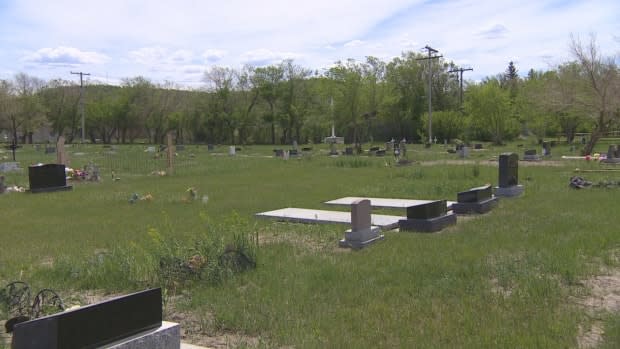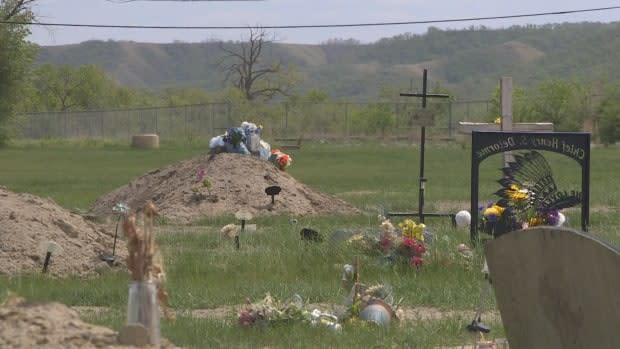Sask. First Nation announces hundreds of unmarked graves found at former residential school site

WARNING: This story contains details some readers may find distressing.
The Cowessess First Nation says it has discovered hundreds of unmarked graves at the site of the former Marieval Indian Residential School in Saskatchewan.
A news release Wednesday from Cowessess and the Federation of Sovereign Indigenous First Nations (FSIN), which represents Saskatchewan's First Nations, did not give a specific number but said it will be the most found to date in Canada.
Cowessess Chief Cadmus Delorme and FSIN Chief Bobby Cameron are scheduled to hold a news conference Thursday morning to provide more details of the findings.
The Marieval Indian Residential School operated from 1899 to 1997 in the area where Cowessess is now located, about 140 kilometres east of Regina.
The First Nation took over the school's cemetery from the Catholic Church in the 1970s.
Earlier this month Cowessess started using ground-penetrating radar to locate unmarked graves.

Last month the Tk'emlúps te Secwépemc First Nation in B.C. announced the discovery of a burial site adjacent to the former Kamloops Indian Residential School that preliminary findings indicate contains the remains of 215 children.
Assembly of First Nations National Chief Perry Bellegarde said the news is tragic but not surprising.
"I urge all Canadians to stand with First Nations in this extremely difficult and emotional time," he posted on Twitter Wednesday evening.
Residential school survivor remembers a friend he never saw again
Barry Kennedy, a residential school survivor who attended Marieval Indian Residential School, said he is shocked by the news but not surprised.
"During my time at Marieval Indian Residential School I had a young friend that was dragged off one night screaming," he said.
Kennedy never saw his little friend again.
"His name was Bryan.... I want to know where Bryan is."
Kennedy said Wednesday's news out of Cowessess is only the tip of the iceberg.
"I would imagine that, you know, by the stories that … were told by our friends and fellow students that there is multiple locations, you know, per school."
"We were introduced to rape. We're introduced to violent beatings. We were introduced to things that weren't normal with our families."
'They deny us our right to grief,' says one Saskatchewan chief
Chief Wayne Semaganis from Little Pine First Nation in Saskatchewan says hearing about the news so close to home is upsetting.
"Even today there is still dismissiveness from the general public — that it's a history, it's in the past," he told CBC News.
"No it's not in the past. It's today. It's ongoing.… [The children buried at residential schools] were murdered — because if there were accidents, if they died of natural causes, somebody would have been alerted."
Semaganis said it's frustrating that even now it's Indigenous people who have to prove that they were hurt.
"There is still too many of the great majority of Canada that don't understand our grief," said Semaganis.
"They deny us our right to grieve. That is what really hurts."
'Horrific truth' of schools: Saskatoon mayor
Saskatchewan Premier Scott Moe issued a written statement Wednesday evening, addressing the news out of Cowessess.
"Today, all of Saskatchewan mourns for those who were discovered buried in unmarked graves near the former Marieval Indian Residential School site," he said.
"I understand many were children, and it is heart breaking to think that so many children lost their lives after being separated from their families, and away from the love and solace only a family can provide. "
Moe said he spoke with FSIN Chief Cameron as well as Cowessess Chief Delorme, offering the full support of the provincial government.
In an interview with CBC Saskatchewan, Saskatchewan NDP Leader Ryan Meili said his heart goes out to the Cowessess First Nation and the trauma they must be feeling.
"We knew this was coming. We knew that this was the case," the Official Opposition leader said.
"Yet you still get this pit in your stomach and just this heart-sinking feeling."
Saskatchewan needs to listen to Indigenous leaders, elders and survivors, said Meili, and act on the Truth and Reconciliation Commission's 94 Calls to Action.
Meili also called on the Catholic Church to release all its records related to abuse at residential schools in order to tell the whole story.
"We need to work alongside the communities that continue to search the residential school sites and make sure we find all of these unmarked graves," Meili said.
"I think about my own kids…. I cannot imagine someone coming and taking them away and having them come back from school months later, you know, broken and sad, or never come home at all."
The City of Saskatoon announced its flags will be lowered to half-mast Thursday morning to honour all the children found in unmarked graves at the Marieval Indian Residential School.
"This brings the horrific truth of these schools right to our doorstep," Saskatoon Mayor Charlie Clark said in a news release.
"Many of these children will have had direct relatives who now live in Saskatoon. They are the missing children that families have been trying to find over the decades."
Support is available for anyone affected by their experience at residential schools, and those who are triggered by the latest reports.
A national Indian Residential School Crisis Line has been set up to provide support for former students and those affected. People can access emotional and crisis referral services by calling the 24-hour national crisis line: 1-866-925-4419.

 Yahoo Movies
Yahoo Movies 